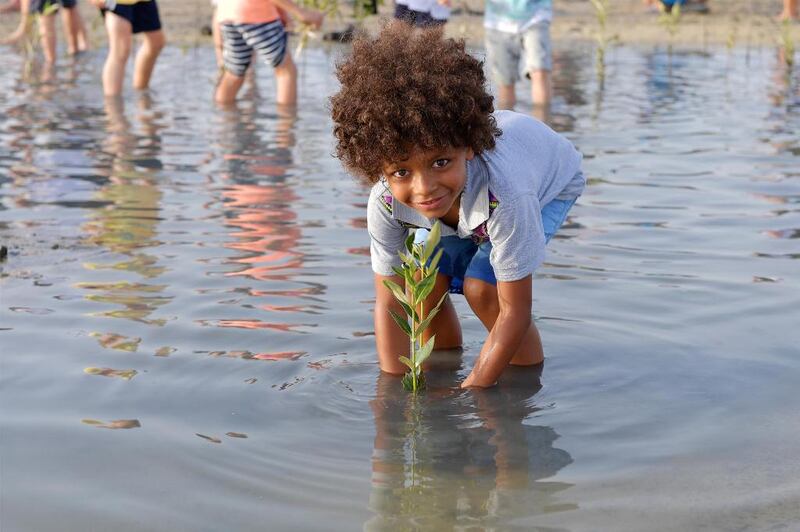The coral reefs, mangroves and seagrass beds of Jebel Ali have been designated a globally significant conservation site.
Jebel Ali Wetland Sanctuary near Ras Ghantoot is home to more than 500 marine species, including the endangered mottled eagle ray and Indo-Pacific humpback dolphin.
Hawksbill turtles nest on its sandy beaches, where 30 nests were recorded last year. Its seagrass beds are fishing nurseries and feeding grounds for endangered green turtles and vulnerable dugongs.
Now the Ramsar Convention on Wetlands, a global conservation agreement, has recognised it as a globally significant site.
There are more than 2,200 sites recognised by the international convention and eight are now in the UAE.
The announcement was made in Dubai on Sunday, the penultimate day of the week-long Ramsar Conference, where 170 signatories to the convention meet every three years to assess the state of wetlands.
The 22 square kilometre area was first declared a sanctuary in 1998 and many marine species that had disappeared because of offshore coastal development returned after 2008.
“Jebel Ali is significant because it hosts a lot of critically endangered species,” said Hiba Al Shehhi, acting director of biodiversity at the Ministry of Climate Change and Environment. “It hosts migratory whales, such as the humpback whale, as well as whale sharks and species of dolphins and it has 34 coral species. It is quite important that we conserve this place because it allows us to conserve the fisheries of the whole UAE.”
Years of research were completed before submitting the site’s bid for Ramsar recognition.
More than a third of the world's wetlands were destroyed between 1970 and 2015.
The recently published Global Wetland Outlook found that wetlands are being lost three times faster than forests, although they can absorb twice as much carbon.
More than a quarter of Abu Dhabi's mangroves were destroyed between 1987 and 2001. Aggressive rehabilitation programmes were introduced, with 3.1 million saplings planted since 2009. Yet rehabilitation is not a substitute for preservation, conservationists have warned.
“Targets have been set to increase existing areas, but when you plant a mangrove area you convert one type of wetland into another, such as tidal areas and mudflats,” said Dr Ritesh Kumar, an expert on biodiversity and ecosystems at Wetlands International, an organisation dedicated to the conservation of wetlands. “This is colonising mudflats and [it][ changes the ecosystem of that area. They are very important for some birds in their own right.”
________________
Read more:
'Life depends on the pulse of the flood': Scientists urge wetland protection to prevent war
Seven in 10 nets used by fishermen are illegal and endanger rare marine wildlife
'Wetlands are the kidneys of the earth': Ramsar conference begins in Dubai
________________
It was also announced separately on Sunday that Sharjah has designated its Al Bridi area as a nature reserve. The Ruler of Sharjah, Dr Sheikh Sultan bin Mohammed Al Qasimi, issued a royal decree protected the reserve near Khor Kalba, on Sharjah's east coast exclave.
However, it is not all good news. Wetlands on the 88 kilometre coast from Umm Al Quwain to the northern Oman border remain without official protection. These include Khor Al Beidah, a tidal wetflat in Umm Al Quwain, and the intertidal mudflats of Al Dhaya in Ras Al Khaimah.
Three wetland areas in Ras Al Khaimah were originally planned as reserves ten years ago but extensive construction on the emirate’s mangroves has uprooted mangrove forests. The RAK Environment Protection and Development Agency did not respond to requests for comment.
Meanwhile, the Ministry of Climate Change will launch a habitat map for marine areas of high importance this week, in partnership with the Emirates Nature-WWF, an organisation which seeks to conserve the UAE's natural heritage. “This will perhaps assist [policy makers] to make more effective decisions towards designation of hotspots,” said Ms Al Shehhi.






